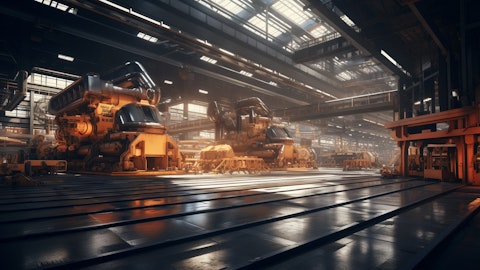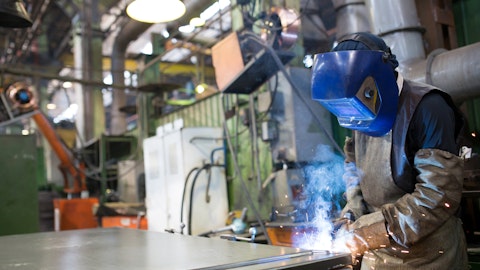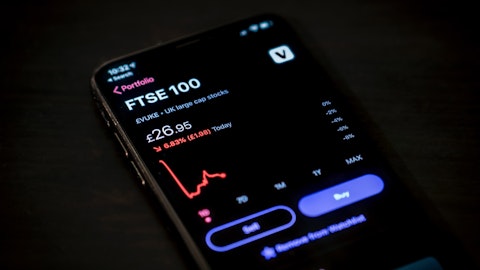Those markets continue to be pretty strong. So it’s a little hard to predict, if those businesses are going to kind of move together. But their demand, I would say, is reasonably steady right now.
Operator: [Operator Instructions] Your next question comes from the line of Brian McNamara with Canaccord Genuity. Your line is open.
Brian McNamara: Hey. Good morning, guys. Congrats on the results.
Andy Rose: Good morning.
Joseph Hayek: Thank you, Brian. Good morning.
Brian McNamara: I hate to put you on the spot, Joe, but I’m going to, I get a lot of questions about the earnings power of the business for maybe some folks new to the story, kind of, can you put up some guardrails in terms of how we should look at the business in terms of both the gross margin side and then, how that flows into EBITDA margin, if you wouldn’t mind?
Joseph Hayek: Yeah. Our gross margin for the quarter was 23.1% and it’s going to be a little different by business. Historically, the consumer products business is going to have higher gross margins just based on what they do and maybe a little bit higher SG&A as a percentage of sales as well. But when we see consumer at kind of 19.3% EBITDA margin in the quarter, that’s kind of what we think and they think good looks like for them. They get good volumes and ultimately you can kind of hang in there, that number around there or better, then we feel really good about it, as revenues grow. The gross margin for Building Products on the heating, cooling and water side of the business was really strong this past quarter. I think it was 6.2%.
They had 130 basis points of that was the LCM that we talked about, which we certainly believe is non-recurring. So that would be adjusted 7.5%. It was 11% a year ago. This is the EBITDA margin I’m talking about, 11% last year. And so, I think you get a normalized environment and you’re certainly significantly higher than 6.2%, got some good things going on there, in the water business you will get through this destocking in the larger propane businesses. And those guys, and that team, I think are absolutely focused on doing the right things. The water business is showing great progress. We talked about some of the businesses historically as kind of having more upside and not really running at full speed. That’s one of them. But there’s big improvement there.
And then the core business continues to think through what’s happening now. But you go back to kind of Andy’s comments on innovation and new product development there’s a lot going on, a lot of good work being done that we think can add both to top line and to margins.
Andy Rose: Yeah. And maybe just to take it up a level Brian, if you think about our long term goals of driving our EBITDA margin up to 24% over the next three to five years, everything that we do is very much focused on that, our transformation playbook is about improving the profitability and the margin profile of the businesses we own today. And as we think about M&A and capital that we’re going to deploy into our innovation pipeline there again, we’re looking to drive not only higher margins, but also higher return on capital. We talk a lot about returns and making more money using less capital where possible. So I think the fact that the businesses are where they are today, there is upside there. But over the long run, we fully expect that we’re going to drive higher margins, and that’ll start at the gross margin line.
Brian McNamara: That’s really helpful, thanks. Just one more for me. I think all my other questions have been answered already. I’m just curious, relative to your Joe or Andy or both of you, relative to your own expectations heading into the separation, I’m curious, have you run into any surprises, either good or bad, in your first kind of three or so months as a separate entity?
Andy Rose: Yeah. I would say the process has been exceptionally smooth. On the surface there’s been a few struggles underneath the surface, but nothing that’s really major. I mean, look, when you take a company that was put together over 68 years, and you try and separate it into two public companies, that’s a lot of work by a lot of people you talk about the IT group separating systems, the finance group having to recast financials, which continues to this day. So there’s just a ton of work, and it’s never perfect, but I would say it’s been an exceptional performance by everybody involved. And we’re fortunate that we get to sit here and kind of on the surface talk about it. But it’s been a tremendous effort and success, I would say, really across the Board. I mean, I don’t know if there’s anything else to add there, Joe, but we’re really proud of everybody that has been a part of it.
Brian McNamara: That’s great. Thanks a lot, guys. Best of luck.
Andy Rose: Thanks.
Operator: Your next question is a follow-up from Kathryn Thompson. Your line is open.
Brian Biros: Hey, guys. It’s Brian.
Andy Rose: Brian she keeps calling you Kathryn, I hope you appreciate that.
Brian Biros: I’ll stick to Brian for today. I had a quick follow-up. I might have got off earlier. In the Building Product segment, I know you guys have called out mix kind of impacting the sales. Overall, though, volume seemed pretty good relative to the destocking going on there. I think only down 2%, I know you touched on it in the opening comments and some of the responses here, but can you just maybe further parse out what was maybe up or down across the different products in that category type? You called out propane, you called out water, anything else to specifically call out? Because it seems like there’s maybe some pretty good stuff going on there that might be masked by the propane destocking in the short term here.




